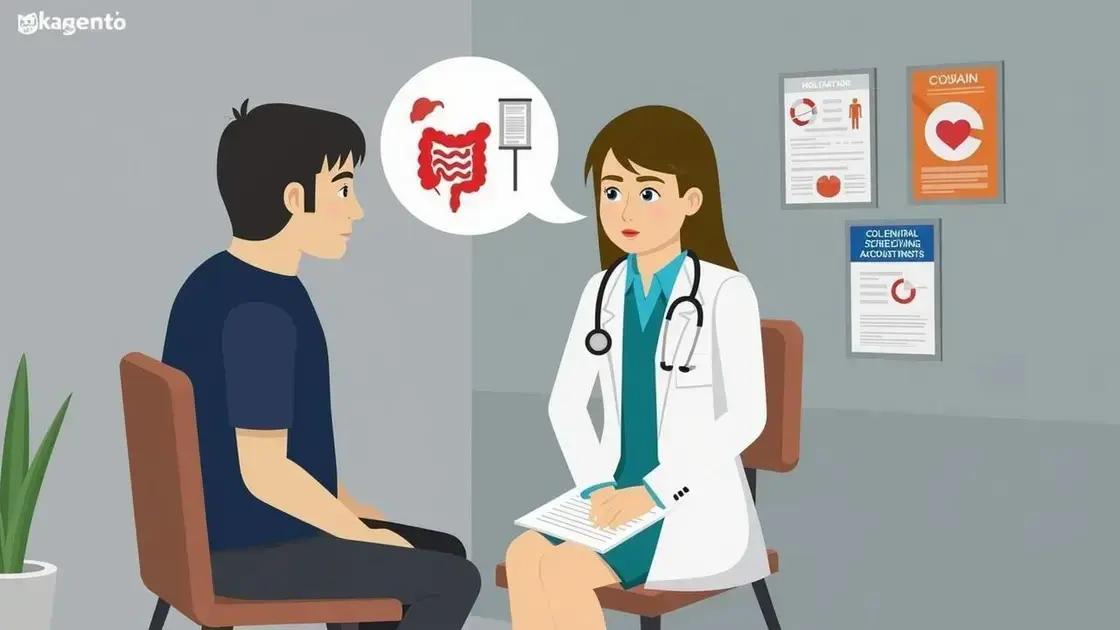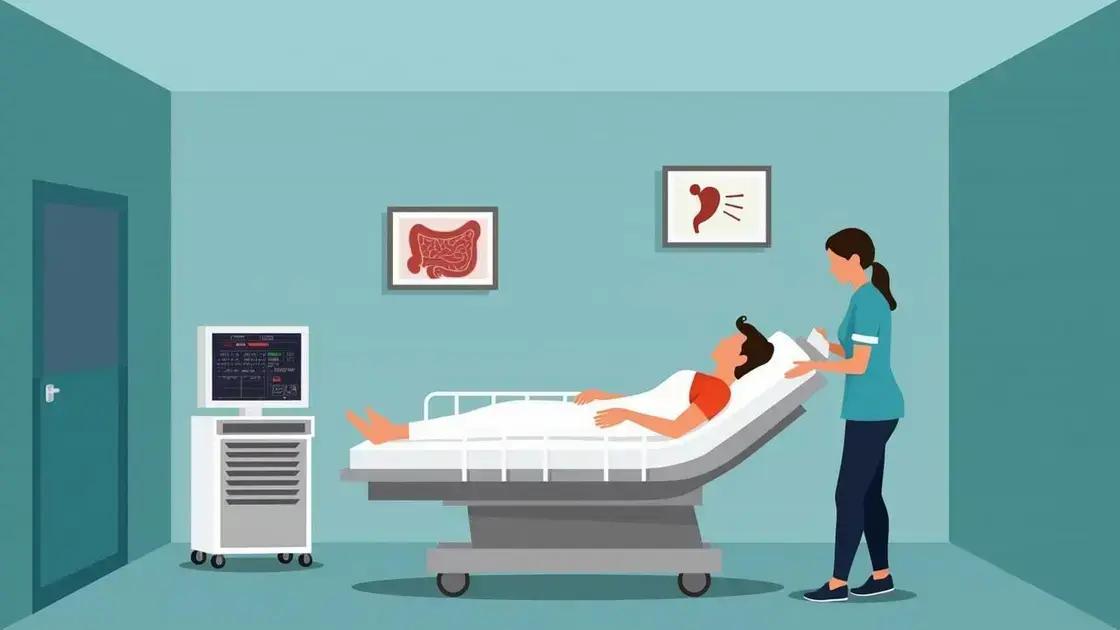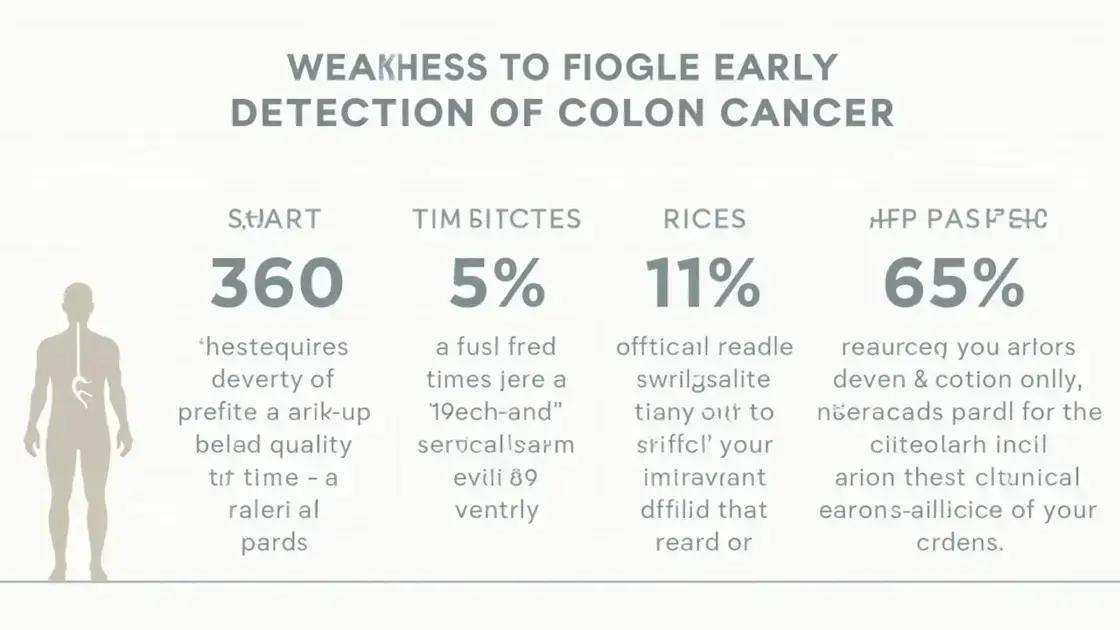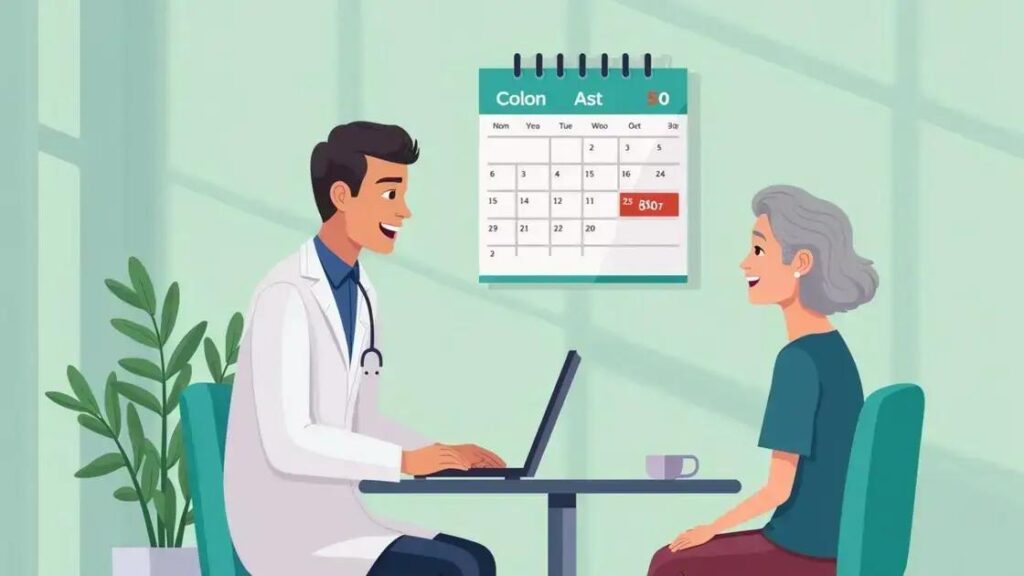Regular colon screenings after age 50 are vital for early detection of colon cancer, significantly increasing survival rates and improving treatment outcomes. Screenings help identify polyps before they become cancerous and are recommended every 10 years if normal. Understanding the procedure and addressing common concerns can empower individuals to actively manage their health.
Regular colon screenings after 50 are crucial for maintaining health and preventing colon cancer. Many people underestimate the importance of these screenings, but they can play a significant role in early detection and treatment. In this article, we will discuss why colon screenings matter after 50, what you can expect during the procedure, and how early detection can positively impact your health.
Why Colon Screenings Matter After 50

Colon cancer is one of the leading causes of cancer deaths, and its risk increases as we age. That’s why colon screenings are essential for individuals over 50. These screenings can detect issues early when treatment is most effective. The process can identify benign polyps before they turn cancerous, significantly improving survival rates.
Uncovering Problems Early
When you reach the age of 50, your chances of developing colorectal cancer start to rise. By undergoing regular colon screenings, you can catch potential problems early. This proactive approach allows for earlier interventions, increasing treatment success rates.
The Recommendations
The American Cancer Society recommends that individuals at average risk begin regular screenings at age 45. However, those with a family history or other risk factors may need to start even earlier. Following these guidelines can help ensure that you stay ahead of potential health issues.
Reducing Anxiety and Uncertainty
Many people worry about the procedure itself or what the results may show. However, understanding that these screenings are vital for your long-term health can reduce anxiety. Remember, the discomfort of the procedure is minor compared to the peace of mind and potential life-saving benefits it can provide.
Improving Health Outcomes
Statistics indicate that regular screenings can lower the incidence of colon cancer by up to 68%. This dramatic reduction showcases how vital these screenings can be. By maintaining an ongoing dialogue with your healthcare provider and scheduling regular screenings, you can take charge of your health.
What to Expect During a Colon Screening

Preparing for a colon screening can feel intimidating, but understanding what to expect can ease your concerns. Typically, the process begins with a consultation with your doctor. During this visit, your health history is reviewed, and you may discuss any symptoms or risk factors that may be relevant to your screening.
Preparation for the Screening
Preparation is key for accurate results. Your doctor will provide instructions on how to prepare, which usually involves following a special diet and using laxatives to cleanse your colon before the procedure. It is important to follow these instructions carefully to ensure your colon is clear for the screening.
The Day of the Procedure
On the day of your colon screening, you will arrive at the medical facility. After checking in, you will change into a hospital gown. An anesthetist will likely meet with you to discuss sedation options, making sure you are comfortable throughout the process.
During the Screening
Once you are sedated, a doctor will insert a flexible tube, called a colonoscope, into your rectum. This tube has a small camera on the end and is used to examine the inner lining of the colon. The procedure usually takes about 30 to 60 minutes.
After the Procedure
Once the screening is complete, you will be moved to a recovery area. Depending on the sedation used, it may take some time before you fully wake up. Medical staff will monitor you and provide instructions on how to care for yourself after returning home. You may experience mild cramping or bloating, but these symptoms typically subside quickly.
After your doctor reviews the findings, they will discuss any next steps with you. If any polyps are found, they may be removed during the screening and sent for further testing.
Frequently Asked Questions about Colon Screenings

What are colon screenings?
Colon screenings are medical procedures that help detect changes or abnormalities in the colon. These screenings can include a colonoscopy, sigmoidoscopy, or bowel imaging tests.
Who should get screened?
The recommendation is that everyone should start regular colon screenings by age 45. However, if you have a family history of colorectal cancer, you may need to begin screenings earlier. Speak with your doctor about the best plan for you.
How often should I get screened?
The frequency of screenings depends on the type of test done and your risk factors. Generally, if everything is normal, a colonoscopy should be repeated every 10 years, while other screening methods may require different intervals.
Does the procedure hurt?
During the screening, you will be sedated. Most people do not feel pain during the procedure itself but may experience mild discomfort afterward due to bloating or cramping.
What if polyps are found?
If polyps are detected during the screening, they are often removed on the spot. The removed polyps are then sent for testing to check for cancerous cells. Your doctor will discuss the results with you.
Can insurance cover colon screenings?
Most insurance plans cover colon screenings. However, it is essential to check with your insurance provider to understand your coverage. Many plans cover screenings fully, especially for people over 45.
What should I do if I have symptoms?
If you experience symptoms like blood in your stool, unexplained weight loss, or ongoing abdominal pain, consult with your doctor immediately. These symptoms are important and may require earlier screening.
The Impact of Early Detection on Health

Early detection of colon cancer can significantly improve health outcomes. When detected at an early stage, colon cancer is highly treatable. In fact, the 5-year survival rate is about 90% for cancers found at an early stage, compared to much lower rates for those diagnosed at later stages.
Understanding the Stages
Colon cancer typically has four stages. If caught in the first stage, the cancer is not yet deeply rooted in the tissue and has not spread to nearby lymph nodes. This provides a greater chance for successful removal and treatment.
Reducing Treatment Complexity
Early detection often means less extensive treatments. For example, individuals diagnosed at an early stage may require only surgery. While later stages may necessitate additional therapies like chemotherapy or radiation, which can complicate recovery.
Improving Quality of Life
Patients diagnosed early often experience fewer treatment side effects. This can lead to a greater quality of life during and after treatment. Many patients can return to their normal routines sooner, which is valuable for mental and emotional health.
Awareness and Monitoring
Regular screenings also lead to increased awareness about colon health. Patients who are informed and proactive about their health tend to seek help sooner if they experience symptoms. This behavior contributes to a trend of better outcomes overall.
Community Health Impact
Widespread early detection practices not only benefit individuals but also improve community health metrics. When fewer individuals are diagnosed with late-stage cancer, healthcare resources are conserved, allowing for better care of all patients.
In Conclusion: The Importance of Regular Colon Screenings
Regular colon screenings after age 50 are essential for early detection of potential health issues. The significant benefits include early cancer detection, reduced treatment complexity, and improved quality of life.
By understanding what to expect during screenings and addressing common questions, individuals can approach this vital health measure with confidence. Early detection not only enhances personal health outcomes but also contributes to the well-being of the community.
With regular screenings and proactive health management, you can take charge of your health and dramatically improve your chances of survival against colon cancer.
FAQ – Frequently Asked Questions about Colon Screenings
What are colon screenings?
Colon screenings are medical procedures designed to detect changes or abnormalities in the colon, such as polyps or cancer.
Who should get screened?
Everyone should start regular colon screenings by age 45. Those with a family history of colorectal cancer may need to begin earlier.
How often should I get screened?
If everything is normal, a colonoscopy should generally be repeated every 10 years. Other screening methods may require different intervals.
Does the procedure hurt?
Most people do not feel pain during the procedure due to sedation, but some may experience mild discomfort afterward.
What if polyps are found?
If polyps are detected, they are often removed during the screening and sent for testing to check for cancerous cells.
Can insurance cover colon screenings?
Most insurance plans cover colon screenings, especially for individuals over 45. It’s important to check your specific coverage.













